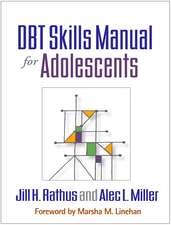Cognitive-Behavioral Therapy in Groups: Understanding What Goes Wrong and Why
Autor Peter J. Bieling, Randi E., Ph.D. McCabe, Martin M. Antonyen Limba Engleză Paperback – 9 aug 2009
An authoritative practitioner guide and student text, this book offers clear advice on how to structure and lead cognitive-behavioral therapy (CBT) groups and overcome common challenges that arise. Specific, evidence-based group assessment and treatment protocols are provided for a range of frequently encountered disorders. Emphasizing that a CBT group is more than the sum of its individual members, the authors show how to understand and use group process to optimize outcomes. Up to date, accessible, and highly practical, the book is filled with session outlines, sample dialogues, checklists, troubleshooting tips, and other user-friendly features.
Preț: 326.31 lei
Preț vechi: 343.49 lei
-5% Nou
62.44€ • 65.43$ • 51.62£
Carte disponibilă
Livrare economică 21 martie-04 aprilie
Livrare express 07-13 martie pentru 38.16 lei
Specificații
ISBN-10: 1606234048
Pagini: 452
Ilustrații: black & white tables
Dimensiuni: 155 x 234 x 33 mm
Greutate: 0.64 kg
Editura: Guilford Publications
Locul publicării:United States
Cuprins
Part I: General Principles and Practice of Cognitive-Behavioral Therapy Groups. Cognitive-Behavioral Therapy Groups: Possibilities and Challenges. Group Processes in CBT: Using Group Dynamics Productively. Cognitive Strategies in CBT Groups. Behavioral Strategies in CBT Groups. Basic Structure and Implementation of CBT Groups. Overcoming Obstacles in CBT Groups: Challenges and Problems in Group Structure. Part II: Cognitive-Behavioral Therapy Groups for Specific Disorders. Panic Disorder and Agoraphobia. ObsessiveߝCompulsive Disorder. Social Anxiety Disorder. Depression. Bipolar Disorder. Eating Disorders. Rotgers, Nguyen, Substance Abuse. Freeman, Stewart, Personality Disorders. Roberts, Pinkham, Penn, Schizophrenia. Part III: Comorbidity and Future Directions. Comorbidity and CBT Groups. The FAQs of CBT Group Intervention.
Recenzii
"An outstanding example of evidence-based practice. I would definitely use this book in a graduate psychotherapy course." - Debra A. Hope, Anxiety Disorders Clinic, Department of Psychology, University of Nebraska, Lincoln, USA
"The book is a must-read for beginning group therapists, providing in-depth coverage on how to perform behavioral strategies in a group, establish group rules, interact with problem members, work with a cotherapist, and decide between sticking with the agenda versus pursuing unplanned group interaction....We wholeheartedly recommend this book." - International Journal of Group Psychotherapy
"This is the book I would have liked to be able to read when I started running CBT groups sixteen years ago....This is a considerably more sophisticated approach to group CBT than has previously been available in the literature....Will be a very valuable resource for professionals setting up and running CBT groups for a wide range of clients, as well as for professionals supervising CBT groups." - Cognitive Behavioral Therapy Book Reviews
Notă biografică
Peter J. Bieling, PhD, Randi E. McCabe, PhD: both at Department of Psychiatry and Behavioural Neurosciences, McMaster University, Ontario, Canada, and St. Joseph’s Healthcare, Hamilton, Ontario, Canada; and Martin M. Antony, PhD, Department of Psychology, Ryerson University, Toronto, Ontario, Canada, and St. Joseph’s Healthcare, Hamilton, Ontario, Canada





















